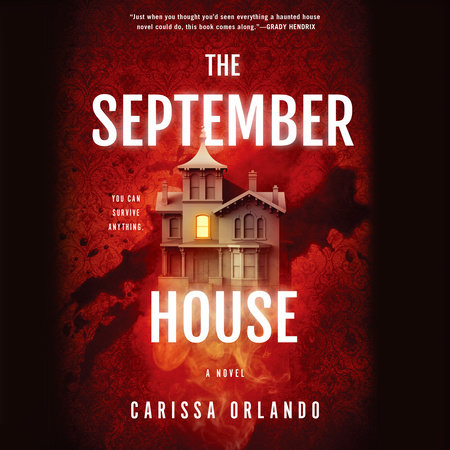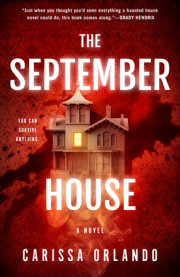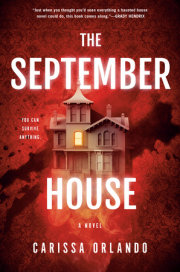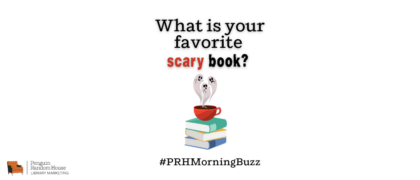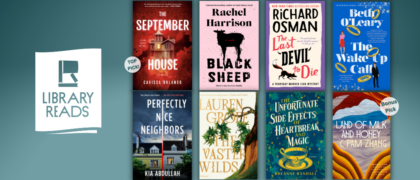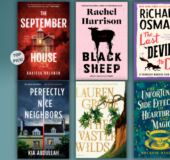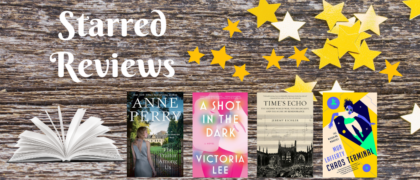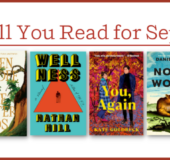One
The walls of the house were bleeding again.
This sort of thing could be expected; it was, after all, September.
The bleeding wouldn't have been so bad if it hadn't been accompanied by nightly moaning that escalated into screaming by the end of the month like clockwork. The moaning started around midnight and didn't let up until nearly six in the morning, which made it challenging to get a good night's sleep. Since it was early in the month, I could still sleep through the racket, but the sleep was disjointed and not particularly restful.
Before Hal absconded to wherever it was he went, he used to stretch and crack what sounded like the entirety of his skeleton. Margaret, he would say, we're getting old.
Speak for yourself, I would reply, but he was right. I was starting to feel a bit like the house itself sometimes-grand but withering, shifting in the wind and making questionable noises when the foundation settled. All the moaning-and-screaming business in September certainly didn't help me feel any younger.
That is to say, I was not looking forward to late September and the nightly screaming. It was going to be a long month. But that's just the way of things.
As for the bleeding, it always started at the top floor of the house-the master bedroom. If I wasn't mistaken, it started above our very bed itself. There was something disconcerting about opening your eyes first thing in the morning and seeing a thick trail of red oozing down your nice wallpaper, pointing straight at your head. It really set a mood for the remainder of the day. Then you walked out into the hallway and there was more of it dripping from in between the cracks in the wallpaper, leaking honey-slow to the floor. It was a lot to take in before breakfast.
As early as it was in September, the blood hadn't yet made it to the baseboards. Give it a week, however, and it would start pooling on the floor, cascading down the stairs in clotting red waterfalls. By the end of the month, deft footwork would be required to walk down the hallway or descend the stairs without leaving a trail of prints throughout the house. I had grown practiced in dodging blood over the past few years, but even I had slipped up on occasion, especially once the screaming was in full effect. Sleep deprivation really takes a toll on your motor functioning.
I used to worry over the walls, getting a bucket and soap and scrubbing until my arms were sore, only to see my work undone before my eyes. I would rub the sponge over a crack in the wallpaper and watch a fresh blob of red leak out of the open wound that was the wall over and over again. The wallpaper is ruined, I fretted, but it never was. It all went away in October. So now I just allowed the walls to bleed and waited patiently.
The first year we were in the house, Hal tried to convince me that the bleeding was just a leak. An oozing red leak. He carried on with that line of reasoning much longer than was logical. By the time the blood poured down the stairs and Hal was almost ready to admit that maybe it wasn't a simple leak, October hit and the blood vanished. Hal considered it a problem solved. I suppose he thought it was an isolated event and never considered that such a thing might be cyclical. He seemed surprised when the blood returned that second September. There's that leak again, he mused, fooling nobody. Everything, of course, changed after the third September, and Hal's opinions about the bleeding during this fourth September could be best summed up by his abrupt absence. I supposed I ought to feel trepidatious about facing September alone. However, I was never quite alone in this house, now, was I?
I couldn’t tell you why the walls bled. I couldn’t tell you why there was screaming at night. I couldn’t tell you why a lot of things happened in this house. Over the years, I had developed a few working theories about the goings-on and why September made everything so much more difficult, but each was half-formed at best. Eventually, one has to give up asking questions, just accept that things are the way they are, and act accordingly. So when I woke up to a wall dripping with blood and to a foggy head from not-quite sleeping through hours of moaning, I simply nodded and got on with my morning.
My only plan for the day was to try to get some painting done. I had learned from past experience that it became difficult to focus on painting or really much of anything as the month progressed, what with the sleep deprivation and the blood and the loud noises and the wounded children running everywhere. As such, I wanted to front-load my pleasures in the hopes that they could carry me through the remainder of the month. Planning is important. So I set myself up in my sunroom studio with a blank canvas, hoping for inspiration. However, I soon found myself staring at a canvas painted entirely in red, which seemed a bit derivative, given the circumstances.
I tapped my paintbrush against my lips and stared at the red canvas, plotting out what to paint. It might have been nice to do a nature scene-some peaceful flowers, waving trees-but all I saw in my mind's eye was a child's face, mutilated and screaming. Perhaps painting was not in the cards for today.
A dull headache poked its way behind my eyes-a foreshadowing of the near-incessant headache I would have by the end of the month-and I sighed, giving up. I plopped my paintbrush, dry and useless, down on my easel and stood. Tea. It was time for tea.
As I walked from my studio into the living room, I could hear Fredricka moving around upstairs, doing something or other in the second-floor bedrooms. I knew all the doors were closed along that hallway (What will we ever do with a five-bedroom house, Margaret? Hal had asked me when we reviewed the listing. We'll have guests, I had responded, a rare moment of prescience for me), but I could still hear noises from within, different from the usual disturbances that arose from behind those closed doors. Jostling and rustling, the changing of linens. The scraping of furniture across the floor in one room, then a light crash coming from another. Fredricka was lively today.
September had an effect on Fredricka. She became busier, more chaotic. She was nervous. She didn't like September, she told me once. She had seen more than a hundred Septembers, so she ought to know.
For her part, Fredricka expelled her September energy through cleaning, stacking things, and rearranging furniture in nonsensical ways. None of these chores were necessary, but I understood her intentions. One has to control something in the face of the great uncontrollable. I left her alone.
Fredricka usually made the tea, but it seemed like it would be my responsibility today. A frown crept onto my face, and I reminded myself a bit of a spoiled child. I chastised myself for my entitlement. Making tea, after all, wasn't particularly burdensome, and it was a bit of good fortune to have Fredricka around at all, considering we hadn't hired her. She had come with the house, in a manner of speaking. Still, one gets used to routines. As I rounded the corner out of the living room and into the foyer, I tried to remember where we kept the tea bags. Fredricka might have moved them. She liked to move things in September, and not because she wanted to be helpful. For all I knew, they had been shoved behind the toilet.
Lost in my thoughts, I was startled to hear a voice behind me.
"Tea, ma'am?" Fredricka asked. Apparently, she hadn't been too distracted to make it, after all.
Despite my surprise upon learning that Fredricka was a nonnegotiable fixture of the house, I had come to realize that I enjoyed her presence. She was reasonably benevolent, or at least as benevolent as anything in the house could be. Still, the sight of her was always a shock to the system. Fredricka was a tall woman, and grand, in a way, as the house itself, with so much of her walled off and expressionless, unwilling to open and allow a peek of what lay inside. And of course, there was that gash on her head, gaping open like a split pumpkin, where the axe had sunk in over a hundred years ago. The wound began at the top of her forehead and stretched down through her right eyebrow. Her eye was sunken in as a result, pupil drifting, not quite right anymore. That took a while to get used to looking at.
I smiled at her. "I can handle it if you're busy."
"No trouble at all, ma'am." Fredricka drifted down the hallway that ran parallel to the stairs and led into the kitchen, her long smock fluttering behind her. I followed.
The kitchen was the brightest room in the house, surrounded with windows displaying the greenery outside, which was just now yielding leaves tinged with yellows and reds. It had been one of the biggest draws of the house for me, with two large ovens, a glimmering white sink, and rows of ornate cabinetry (original wood, mind you). It turned out to be comparatively peaceful in here, and I usually ate my meals at the kitchen table instead of in the grand dining room just a few feet away. For some reason, the blood never made it into the kitchen, so this room would be a particular haven as September raged on. A true blessing, that was; seeing blood staining those pristine surfaces, however temporarily, would have broken my heart. I'd grown used to seeing carnage inches from my food (Fredricka prepared most of the meals, after all), but one must draw a line somewhere.
Fredricka busied herself with the kettle, filling it with water and placing it on the stove. Not wanting to stand like a statue waiting for Fredricka to serve me, I walked over to the basement door just off the kitchen to check the wooden boards nailed into the doorframe. I had replaced them recently, but I tugged on each beam all the same, testing the strength. Four of them were firm, but one wiggled a little. I inspected the nails-just as I thought, coming loose. In the year since the boards had gone up, I found that the nails did that from time to time. Checking the boards was essential. I made a mental note that the beam would need to be replaced soon. Not urgent, but best to act on these things sooner rather than later. I gripped the doorknob and gave it a tug. The door remained closed, held tight by the boards. I traced my finger over the small crack-a recent addition-that snaked down from the top of the door nearly midway to the doorknob, sharp but not large enough to threaten the integrity of the wood. Everything, for the most part, was as it should have been.
Turning back into the kitchen, I noticed that Elias had materialized next to the stove. I sighed. Elias could be a bit of a bother.
Elias was nine or ten. I could never remember. Whatever his age was, he was scrawny, with a smattering of unruly dark hair on his head. He always looked the same-gaunt and empty, his dirty white cotton shirt draping over dark shorts, and one sad knee sock dangling by his ankle. He stared at me with milky eyes and a sullen face. He didn't have any visible wounds like Fredricka, but could somehow be just as eerie, if not more. I couldn't interact with Elias the way I could with Fredricka, although God knows I'd tried: I tried asking him questions, telling him to tap his foot once for yes and twice for no; I tried asking him to move the planchette on a Ouija board; I even tried making outlandish statements about World War II just to get a rise out of him. Nothing. So I hate to say it, but I started treating him like a plant, narrating my life out loud to him with no expectation of him responding or even hearing. It looks like rain today, Elias. Oh, Elias, seems like the mail is running late. Not that we're expecting anything but bills, anyway. For his part, Elias just stared.
"Can I make you something to eat, ma'am?" Fredricka asked, busying herself around Elias as if he were not there. Elias and Fredricka had nothing to do with each other and I had never seen them interact. I had started to assume Fredricka didn't even see Elias until one day she referred to him as "that boy." No clues regarding Elias' perceptions of Fredricka were ever available, seeing as he never spoke, only howled periodically.
"Some toast, perhaps?" I responded. I moved to the pantry to retrieve the bread before Fredricka could get to it. We had an electric toaster, but Fredricka's ability to use technology popularized after her death was sporadic at best. I tried to teach her about the toaster and even had her successfully use it once, but her preference was to roast the bread on a toasting fork over a fire, like she used to do. It was muscle memory for her; she just did what she was always used to doing. I understood and even empathized (aren't we all creatures of habit in the end?) but the process took forever and I was hungry.
"I think we still have some strawberry jam." I motioned to the fridge. This would give Fredricka something to do. After months and months of trying to convince Fredricka that she had no obligation to be our housekeeper and was free to do whatever she wanted on this earth, I learned that all Fredricka seemed to be capable of doing was work, and all she wanted from me was to be given things to do. All right, then.
Elias watched me with those unblinking eyes as I retrieved the bread from the pantry and a plate from the cupboard. He was like the Mona Lisa, eyes following me about the room, expression unreadable. It had initially been unsettling, but one grows used to unsettling things.
Fredricka rummaged around in the fridge. "We do have strawberry jam, ma'am," Fredricka said. "Or, if ma'am prefers, we also have blackberry."
"Blackberry sounds good, actually." I turned with my bread, and walked towards the toaster. Elias was standing directly in front of it, empty eyes leering into mine. This was going to be a problem.
Copyright © 2023 by Carissa Orlando. All rights reserved. No part of this excerpt may be reproduced or reprinted without permission in writing from the publisher.

